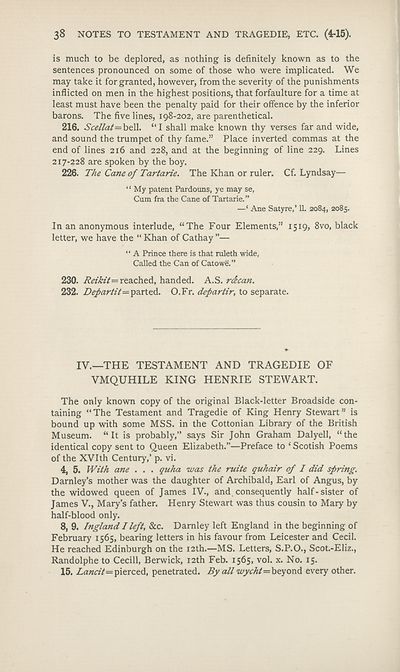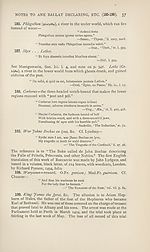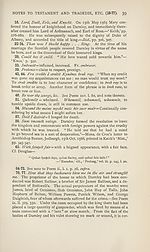Scottish Text Society publications > Old series > Satirical poems of the time of the reformation > Volume 2, 1893
(54)
Download files
Complete book:
Individual page:
Thumbnail gallery: Grid view | List view

38 NOTES TO TESTAMENT AND TRAGEDIE, ETC. (4-15).
is much to be deplored, as nothing is definitely known as to the
sentences pronounced on some of those who were implicated. We
may take it for granted, however, from the severity of the punishments
inflicted on men in the highest positions, that forfaulture for a time at
least must have been the penalty paid for their offence by the inferior
barons. The five lines, 198-202, are parenthetical.
216. Scellat=bt\\. “I shall make known thy verses far and wide,
and sound the trumpet of thy fame.” Place inverted commas at the
end of lines 216 and 228, and at the beginning of line 229. Lines
217-228 are spoken by the boy.
226. The Cane of Tartarie. The Khan or ruler. Cf. Lyndsay—
“ My patent Pardouns, ye may se,
Cum fra the Cane of Tartarie.”
—‘ Ane Satyre,’ 11. 2084, 2085.
In an anonymous interlude, “The Four Elements,” 1519, 8vo, black
letter, we have the “ Khan of Cathay ”—
" A Prince there is that ruleth wide,
Called the Can of Catowe.”
230. A,«/JzV= reached, handed. A.S. r<zca7i.
232. Defartit=parted. O.Fr. departir, to separate.
IV.—THE TESTAMENT AND TRAGEDIE OF
VMQUHILE KING HENRIE STEWART.
The only known copy of the original Black-letter Broadside con¬
taining “The Testament and Tragedie of King Henry Stewart” is
bound up with some MSS. in the Cottonian Library of the British
Museum. “It is probably,” says Sir John Graham Dalyell, “the
identical copy sent to Queen Elizabeth.”—Preface to ‘ Scotish Poems
of the XVIth Century,’ p. vi.
4, 5. With ane . . . quha was the ruite quhair of I did spring.
Darnley’s mother was the daughter of Archibald, Earl of Angus, by
the widowed queen of James IV., and consequently half-sister of
James V., Mary’s father. Henry Stewart was thus cousin to Mary by
half-blood only.
8, 9. Ingland I left, &c. Darnley left England in the beginning of
February 1565, bearing letters in his favour from Leicester and Cecil.
He reached Edinburgh on the 12th.—MS. Letters, S.P.O., Scot.-Eliz.,
Randolphe to Cecill, Berwick, 12th Feb. 1565, vol. x. No. 15.
15. pierced, penetrated. By all wycht=beyond every other.
is much to be deplored, as nothing is definitely known as to the
sentences pronounced on some of those who were implicated. We
may take it for granted, however, from the severity of the punishments
inflicted on men in the highest positions, that forfaulture for a time at
least must have been the penalty paid for their offence by the inferior
barons. The five lines, 198-202, are parenthetical.
216. Scellat=bt\\. “I shall make known thy verses far and wide,
and sound the trumpet of thy fame.” Place inverted commas at the
end of lines 216 and 228, and at the beginning of line 229. Lines
217-228 are spoken by the boy.
226. The Cane of Tartarie. The Khan or ruler. Cf. Lyndsay—
“ My patent Pardouns, ye may se,
Cum fra the Cane of Tartarie.”
—‘ Ane Satyre,’ 11. 2084, 2085.
In an anonymous interlude, “The Four Elements,” 1519, 8vo, black
letter, we have the “ Khan of Cathay ”—
" A Prince there is that ruleth wide,
Called the Can of Catowe.”
230. A,«/JzV= reached, handed. A.S. r<zca7i.
232. Defartit=parted. O.Fr. departir, to separate.
IV.—THE TESTAMENT AND TRAGEDIE OF
VMQUHILE KING HENRIE STEWART.
The only known copy of the original Black-letter Broadside con¬
taining “The Testament and Tragedie of King Henry Stewart” is
bound up with some MSS. in the Cottonian Library of the British
Museum. “It is probably,” says Sir John Graham Dalyell, “the
identical copy sent to Queen Elizabeth.”—Preface to ‘ Scotish Poems
of the XVIth Century,’ p. vi.
4, 5. With ane . . . quha was the ruite quhair of I did spring.
Darnley’s mother was the daughter of Archibald, Earl of Angus, by
the widowed queen of James IV., and consequently half-sister of
James V., Mary’s father. Henry Stewart was thus cousin to Mary by
half-blood only.
8, 9. Ingland I left, &c. Darnley left England in the beginning of
February 1565, bearing letters in his favour from Leicester and Cecil.
He reached Edinburgh on the 12th.—MS. Letters, S.P.O., Scot.-Eliz.,
Randolphe to Cecill, Berwick, 12th Feb. 1565, vol. x. No. 15.
15. pierced, penetrated. By all wycht=beyond every other.
Set display mode to: Large image | Zoom image | Transcription
Images and transcriptions on this page, including medium image downloads, may be used under the Creative Commons Attribution 4.0 International Licence unless otherwise stated. ![]()
| Publications by Scottish clubs > Scottish Text Society publications > Old series > Satirical poems of the time of the reformation > Volume 2, 1893 > (54) |
|---|
| Permanent URL | https://digital.nls.uk/107427407 |
|---|
| Attribution and copyright: |
|
|---|
| Description | A collection of over 100 Scottish texts dating from around 1400 to 1700. Most titles are in Scots, and include editions of poetry, drama, and prose by major Scottish writers such as John Barbour, William Dunbar, Gavin Douglas, and George Buchanan. Edited by a key scholarly publisher of Scotland's literary history, and published from the late 19th century onwards by the Scottish Text Society. Available here are STS series 1-3. |
|---|

